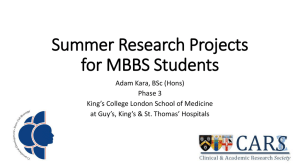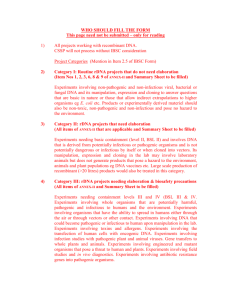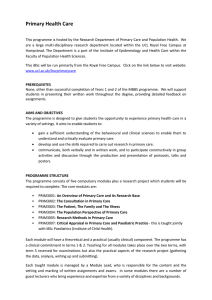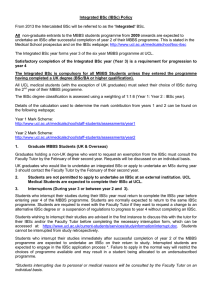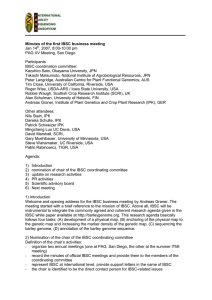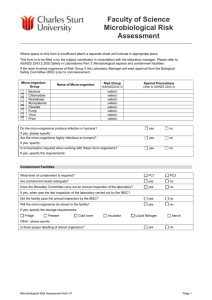Integrated BSc (IntBSc) Strategy 2010-15 Quality, Focus and Value Introduction
advertisement
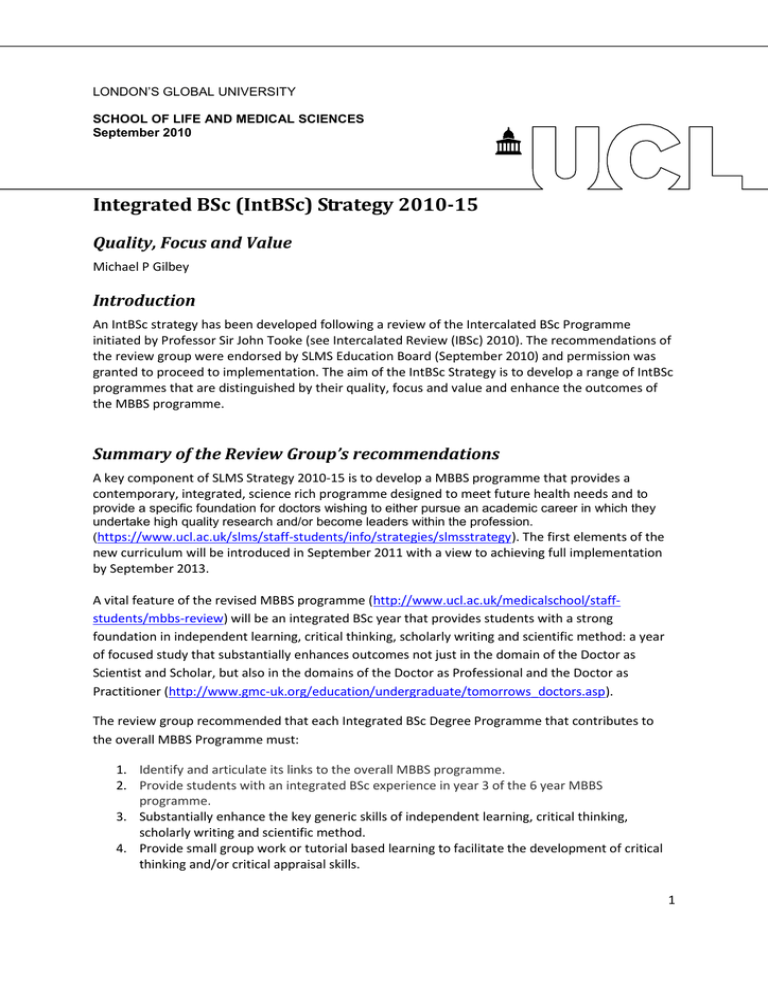
LONDON’S GLOBAL UNIVERSITY SCHOOL OF LIFE AND MEDICAL SCIENCES September 2010 Integrated BSc (IntBSc) Strategy 2010-15 Quality, Focus and Value Michael P Gilbey Introduction An IntBSc strategy has been developed following a review of the Intercalated BSc Programme initiated by Professor Sir John Tooke (see Intercalated Review (IBSc) 2010). The recommendations of the review group were endorsed by SLMS Education Board (September 2010) and permission was granted to proceed to implementation. The aim of the IntBSc Strategy is to develop a range of IntBSc programmes that are distinguished by their quality, focus and value and enhance the outcomes of the MBBS programme. Summary of the Review Group’s recommendations A key component of SLMS Strategy 2010-15 is to develop a MBBS programme that provides a contemporary, integrated, science rich programme designed to meet future health needs and to provide a specific foundation for doctors wishing to either pursue an academic career in which they undertake high quality research and/or become leaders within the profession. (https://www.ucl.ac.uk/slms/staff-students/info/strategies/slmsstrategy). The first elements of the new curriculum will be introduced in September 2011 with a view to achieving full implementation by September 2013. A vital feature of the revised MBBS programme (http://www.ucl.ac.uk/medicalschool/staffstudents/mbbs-review) will be an integrated BSc year that provides students with a strong foundation in independent learning, critical thinking, scholarly writing and scientific method: a year of focused study that substantially enhances outcomes not just in the domain of the Doctor as Scientist and Scholar, but also in the domains of the Doctor as Professional and the Doctor as Practitioner (http://www.gmc-uk.org/education/undergraduate/tomorrows_doctors.asp). The review group recommended that each Integrated BSc Degree Programme that contributes to the overall MBBS Programme must: 1. Identify and articulate its links to the overall MBBS programme. 2. Provide students with an integrated BSc experience in year 3 of the 6 year MBBS programme. 3. Substantially enhance the key generic skills of independent learning, critical thinking, scholarly writing and scientific method. 4. Provide small group work or tutorial based learning to facilitate the development of critical thinking and/or critical appraisal skills. 1 5. Expose students to other professionals and scientists and, where possible, encourage joint working and learning in preparation for the multidisciplinary nature of clinical practice and research. 6. Identify and articulate its links to UCLPartners academic themes (http://www.uclpartners.com/)1. 7. Allow sufficient time for students to comply with the overall requirements of the MBBS programme during the IntBSc year (for example maintenance of the portfolio) 8. Provide robust personal tutoring in line with UCL requirements. 9. Consist of four course units and provide a compulsory laboratory, field, or literature based project: the project contributing 1 - 1.5 course units. Where the project consists of a literature based study this will need to be sufficiently robust to ensure students gain the appropriate competencies in data analysis and interpretation. Working with the Medical School Quality Assurance Unit a strategy group will be responsible for ensuring that all programmes are of excellent quality, are aligned to the needs of The UCL Doctor and that an appropriate range of IntBSc Degree Programmes are available. All IntBSc providers will need to make a financial contribution to IBSc Programme proportionate to their IBSC HEFCEt income to cover administrative costs of the overall IBSc programme. All IntBSc providers will be required to complete an annual return to enable the strategy group to assess the compliance of their programme against the requirements outlined above. The suggested deadline for full compliance is September 2012 to meet the revised curriculum implementation date of September 2013. Where quality standards cannot be met by a programme the strategy group will recommend discontinuation of that programme. While working to maintain an appropriate breadth of degree programme choice, some current IBSc degree programmes will be identified as uneconomic in their current form. Such programmes will either have to merge with suitable partners, broaden their intake or discontinue. Implementation Process From January 2011 UCL will neither customarily accept external applications to the IBSc Programme nor customarily permit UCL students to leave the IBSc Programme to study at external institutions. From September 2012 the IBSc programme will run exclusively within year 3 of the 6 year MBBS programme. The name Integrated BSc will adopted from September 2013. The key features of the proposed structure to achieve quality management and enhancement are outlined in Fig. 1. The IBSc Steering Committee is established and is responsible for overseeing and monitoring the IBSc programme. 1 Either the programme’s links to the UCLP emerging research theme areas or the overall themes of: harnessing academia to effect health gain; improving the health of populations locally, nationally or globally; illness prevention or the role of primary care/novel service provision. 2 To ensure that all IBSc degree programmes are fit for purpose an IBSc strategy group (Sub Dean IBSc, all MBBS Curriculum Sub Deans, FLS Faculty Tutor) will be established and work with the IBSc Steering Committee to: Oversee the annual review that will monitor programme quality and alignment with required MBBS programme outcomes. Provide feedback to degree programme organisers and in cases where programmes have not met the required essential criteria explain the action required to become compliant and the timeline. For the degree programme to remain in the IBSc portfolio the degree programme tutor will be required to produce an action plan that will need to be endorsed by the IBSc strategy group. Commission new IBSc degree programmes/modules and/or discontinue established degree programmes/modules as indicated following review . Ensure that number of IBSc degree programmes offered provide suitable student choice over the range of programmes deemed to be appropriate while being mindful of resource limitations. As part of the monitoring process an IBSc Programme student staff committee will be established and all students will complete a questionnaire concerning their IBSc experience: this questionnaire will supplement degree programme specific feedback. FIG. 1 3 Objectives for April 2011 Each IBSc Degree Management Group will either provide evidence that their programme meets the essential criteria for IBSc programmes or where there is non-compliance provide details of planned changes, an indicative timeline for changes and any possible barriers to implementation (see IBSc Degree programme Return at end of this document). The IBSc Steering Committee and IBSc Strategy Group will then endorse the IBSc Degree Programme, approve the planned changes and timeline or provide feedback on the rejected action plan. If it is considered that the degree programme could meet the criteria every effort will be made to assist the degree programme organisers to successfully address issues of concern with a view to approval. Full compliance required by September 2012 Degree programmes will be required to become fully compliant by September 2012 for inclusion in the IntBSc programme academic year 2013-14. 4 APRIL Annual IBSc Degree programme Return Self assessment of compliance with essential criteria (see “Essential Criteria for IBSc Programmes within the MBBS programme” in Intercalated BSc (IBSc) Review and Strategy Document 2010) Category REQUIREMENT Financial Viability The Degree Programme must be financially viable Timing and Selection The IBSc year must be provided to medical students exclusively in year 3 of the 6 year MBBS undergraduate programme (from 201213). 1 2 Self assessment statement on compliance Details of changes planned or areas under review Indicative timeline for implementation of planned changes or review Challenges to implementation Evidence used to verify extent of compliance (name specific documents) Overall ranking in academic achievement is not used for allocation of student places on 5 programme or on modules Programme Orientation and Content Induction Session Provided 3 4 Provides students with exposure to other professionals and scientist. 5 Clearly addresses the key generic skills of independent learning, critical thinking, scholarly writing and scientific method. Identify links with UCLP/ASHC 6 7 Provides sufficient time for students to maintain clinical contact (e.g., maintenance of 6 portfolio) Teaching Methods 8 Provides small group work or tutorial sessions to facilitate the development of high level skills such as critical thinking. 9 Provides robust personal tutoring in line with the requirements of the MBBS course overall 10 Consists of 4 course units and provides a compulsory laboratory, field, or literature based project. The project must contribute between 1 and 1.5 course units. 11 Literature based project is sufficiently robust to ensure students gain the appropriate 7 competencies outlined under criteria 5 in Essential Criteria Document Quality management and Enhancement 12 Degree Programme annual return completed providing Degree Programme and Module Mark statistics 13 Response to student feedback from questionnaires and SSCC 8
